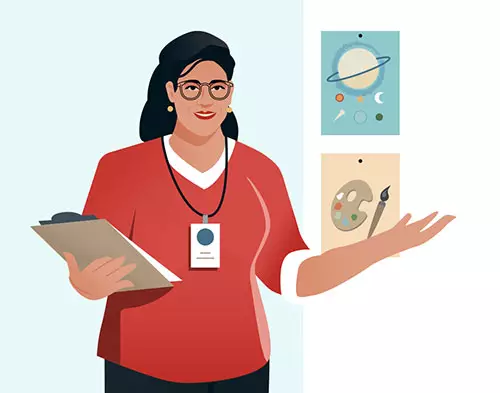Career Guide
Elementary school teacher
If you're passionate about fostering learning and creativity, inspiring curiosity and making a lasting impact on young lives, you may find a fulfilling career as an elementary school teacher.
If you're passionate about fostering learning and creativity, inspiring curiosity and making a lasting impact on young lives, you may find a fulfilling career as an elementary school teacher.
Career overview
Elementary school teachers play a crucial role in the academic, social and emotional development of children in grades K-8. They are responsible for creating and delivering engaging lesson plans across a broad range of subjects, including English, mathematics, science and social studies. Beyond imparting academic knowledge, these educators also focus on fostering critical thinking, promoting creativity and instilling important life skills such as cooperation, respect and responsibility.
Other duties may include regularly communicating with parents regarding their child's progress, providing students with individualized learning support, preparing students for standardized state tests and managing behavior inside and outside of the classroom. Through their work, elementary school teachers equip students for future academic challenges in middle school and lay the foundational stones for lifelong learning.
Over 1.4 million elementary school teachers were employed nationally in 2023, according to the Bureau of Labor Statistics (BLS). While teaching opportunities are available at private institutions, public elementary schools remain the largest employers of these professionals.
What to expect
Salary range
$51 - 81K
Elementary school teachers within the 25th to 75th percentile earned salaries ranging from $51,260 to $81,480 in 2023, according to BLS nationwide statistics.[1]
[1] The salary ranges are not specific to students or graduates of University of Phoenix. Actual outcomes vary based on multiple factors, including prior work experience, geographic location, and other factors specific to the individual. University of Phoenix does not guarantee employment, salary level, or career advancement. BLS data is geographically based. Information for a specific state/city can be researched on the BLS website. The BLS Projected Growth for 2023-2033 is published by the US Bureau of Labor Statistics. This data reflects the BLS’ projections of national (not local) conditions. These data points are not specific to University of Phoenix students or graduates.
Challenges
While being an elementary school teacher can be an incredibly fulfilling career, it also has its challenges. Enrollment in public schools has been on the decline since 2020 — the first year of the pandemic — and is expected to continue . This is due to a projected decrease
in the school-age population and a shift towards alternative schooling methods
like charter schools, private schools and homeschooling. Job growth in public schools is also dependent on state and local government budgets
. For this reason, budget deficits could result in layoffs for school faculty and staff.
However, there is some good news. Although class sizes are expected to be reduced, the number of classes should remain steady and result in a need for more teachers in schools where parents and teachers advocate for smaller class sizes. Large class size and insufficient resources are stressors for teachers
, but with smaller classes, those challenges could start to resolve themselves.
Advantages
The elementary school teacher career can offer a unique schedule. Many school districts have a traditional 10-month school year with a short winter vacation and a two-month summer break. For teachers in these districts, this schedule allows time for rejuvenation, personal development and family time or travel that can enrich teaching. However, these teachers may also work during the summer, if they’d prefer. With strong job security when achieving tenure where available
, teaching can allow for a rare work-life balance and stability, making it an appealing and fulfilling career for those eager to impact the next generation.
What to expect
Salary range
$51 - 81K
$51K
$81K
Elementary school teachers within the 25th to 75th percentile earned salaries ranging from $51,260 to $81,480 in 2023, according to BLS nationwide statistics.[1]
Projected growth (2023-2033)
10,000 jobs less
Job growth for this career is expected to decrease by 1% in the next decade. Most job openings will be a result of teachers changing careers or exiting the workforce, BLS reports.[1]
[1] The salary ranges are not specific to students or graduates of University of Phoenix. Actual outcomes vary based on multiple factors, including prior work experience, geographic location and other factors specific to the individual. University of Phoenix does not guarantee employment, salary level or career advancement. BLS data is geographically based. Information for a specific state/city can be researched on the BLS website. The BLS Projected Growth for 2023-2033 is published by the US Bureau of Labor Statistics. This data reflects the BLS’ projections of national (not local) conditions. These data points are not specific to University of Phoenix students or graduates.
About our source
The Bureau of Labor Statistics (BLS) is an agency of the United States Department of Labor that serves as part of the U.S. Federal Statistical System. Find out more: https://www.bls.gov/bls/about-bls.htm
Career-relevant knowledge and skills
Elementary school teachers may require in-depth knowledge of the following topics in this role:

Soft skills
To foster a positive and dynamic learning environment, elementary school teachers should possess a blend of soft skills including strong verbal and written communication, patience, resourcefulness, active listening and time management.
Education and experience
The elementary school teacher career requires specific academic credentials and hands-on experience. Below, we outline the key education and career steps typically involved in navigating the elementary school teacher career path:




Career enhancement
Being a lifelong learner means continually advancing your skills, even after you’ve achieved your career goals. Here are a few ways you can keep leveling up:
- Pursue a master’s degree: Depending on the state and district, some teachers are mandated to earn a master's degree after obtaining certification and securing a job. Even where it's not obligatory, holding a master's degree in education or a specialized subject may lead to higher salaries and greater career advancement opportunities. To progress into higher roles, you may consider master’s education degrees in Curriculum and Instruction or Administration and Supervision.
- Continue professional development and education: To maintain their licensure, elementary school teachers are also usually required to continue their professional development
through workshops, seminars or advanced courses. This not only improves your chances for career advancement but ensures that you remain updated on current educational practices.
- Seek leadership roles: With experience and, in some cases, additional academic credentials, teachers can eventually pursue leadership roles
, like grade-level chair, instructional coordinator for education programs or administrative positions such as assistant principal or school principal.
Programs
At University of Phoenix, we offer certificate, undergraduate and graduate programs that lead to the elementary school teacher outcome. Our programs allow you to fit your education into your busy schedule, taking one course at a time in five- to six-week intervals. Learn more about which of these programs — focused on teaching you the skills you’ll need in your career — is right for you.
How can University of Phoenix support me in pursuing my career goals?
Students and graduates can access our Career Navigator tools, which can help you evaluate career options, track career-relevant skills and discover job postings suited to your needs. From resumé building and interview preparation to networking and mentorship, University of Phoenix offers career services for life to all students and graduates. Dive deeper into our career services, resources and tools to find out how we can help you reach your goals.



